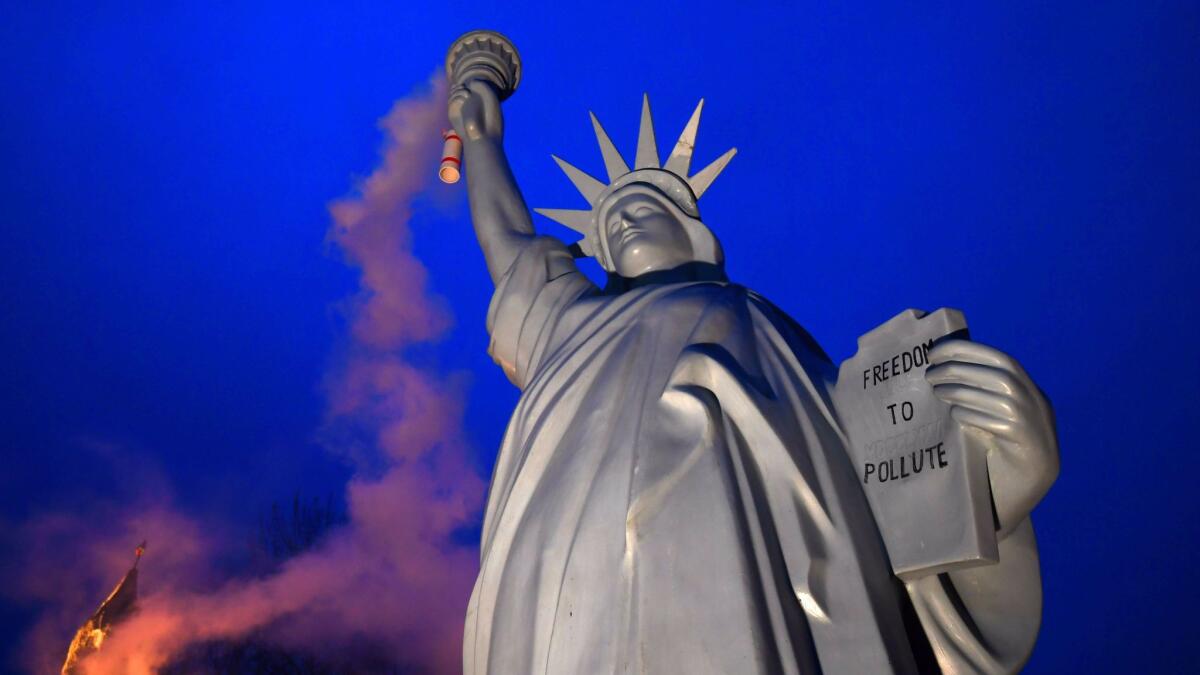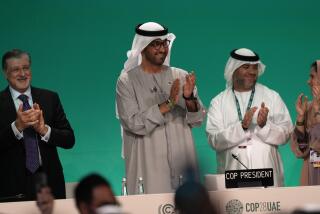As Trump administration touts coal at U.N. gathering, U.S. cities and states target climate change

The sharp political divisions in the United States over climate change spilled over to the outside world at the United Nations conference that will likely be remembered for two rival delegations that showed up from the U.S.
As Trump administration officials attending a U.N. climate change conference in Bonn made headlines for promoting coal as an energy source for the future, an alliance of cities, states, companies and universities from across the United States tacitly usurped the federal government’s role and sought to assure an anxious international community that vast numbers of Americans remain committed to the 2015 Paris accord designed to fight climate change.
The presentation on coal prompted former New York Mayor Michael R. Bloomberg to quip: “Promoting coal at a climate summit is like promoting tobacco at a cancer summit.”
Each country is ordinarily represented by one official delegation at international gatherings, and the presence of two competing camps from the United States created an extraordinary atmosphere at the conference, which ended Friday. It was the first such gathering on climate change since President Trump decided in June to pull the United States out of the Paris accord.
The loud and colorful U.S. coalition of cities and states that supports the Paris agreement and action against climate change not only stole the show in Bonn with its gigantic pavilion featuring free beer and high-spirited panel discussions, but it managed to help galvanize the other 195 countries in the Paris pact against the Trump administration.
“We can’t just wait for our national leaders — we need to take action together,” California Gov. Jerry Brown told a panel discussion in Bonn. Brown was appointed as a special advisor for states and regions by the U.N. conference president.
Brown added that the American states, cities and businesses in the alliance and committed to the Paris agreement had enormous economic clout and together represent “a bigger economy than any nation outside the United States and China.” The unofficial American delegation included 20 states, 110 cities and 1,400 businesses.
Along with Bloomberg, other prominent Americans promoting the fight against climate change and distancing themselves from the Trump administration were former Vice President Al Gore and Democratic Sens. Ben Cardin of Maryland, Brian Schatz of Hawaii, Ed Markey of Massachusetts and Sheldon Whitehouse of Rhode Island.
“When President Trump announced his intention to withdraw from the Paris agreement, some people worried that it meant the end of America’s climate leadership — but I think that can’t be farther from the truth,” Bloomberg said.
Speaking earlier in the pavilion called the “U.S. Climate Action Center,” Sen. Cardin tried to assuage fears that the United States would turn its back on the issue: “We are still in and will remain in, and we will make sure that America does its share as global citizens to change course.”
It was a message that delegates from the other countries were eager to hear after months of uncertainty about where the United States is headed on the issue. The United States is historically the world’s leading emitter of the greenhouse gases that scientists believe are responsible for rising global temperatures. When Syria announced last week that it would join the Paris agreement, that would make the U.S. the only U.N. member not a party to the accord, if it withdraws as Trump threatened.
The official U.S. delegation in Bonn, led by Trump’s special assistant on energy and the environment, George David Banks, was unabashedly proactive in getting out its message at its only official appearance. Even though the conference as a whole aimed to shift the global economy away from fossil fuels, Banks led a panel discussion entitled, “The Role of Cleaner and More Efficient Fossil Fuels and Nuclear Power in Climate Mitigation.”
“This panel is only controversial if we choose to bury our heads in the sand and ignore the realities of the global energy system,” said Banks, who faced hecklers in the audience later removed by security. He called it naive for people to believe that renewable energy could meet all of the world’s power needs and said that fossil fuels were important for reducing global poverty and saving American jobs.
He later answered a question from the audience to clarify the Trump administration’s position on climate change by saying: “Climate mitigation is an important goal of the United States. But I don’t think it’s any surprise that economic security and energy security are higher priorities.”
The clash between the two dueling U.S. delegates at the climate conference left a lasting impression on observers.
“While the U.S. official presence was subdued in the negotiations, the surge of sub-national action in the U.S. is undeniable,” said Paula Caballero, global director of the climate program at the World Resources Institute, in a statement at the end of the conference on Friday. “Having already abandoned its leadership role, the Trump administration appears to be living in an alternate universe with its ill-advised focus on fossil fuels.”
Kirschbaum is a special correspondent.
ALSO
In Zimbabwe, Mugabe’s fall appears to mark the end of Africa’s postcolonial ‘Big Men’ era
Football — the American kind — is all the rage in Mexico
If the Middle East is a chessboard, here’s how the pieces line up in light of recent developments
More to Read
Start your day right
Sign up for Essential California for news, features and recommendations from the L.A. Times and beyond in your inbox six days a week.
You may occasionally receive promotional content from the Los Angeles Times.






